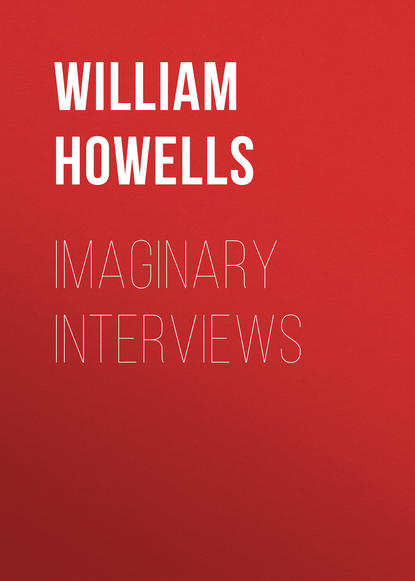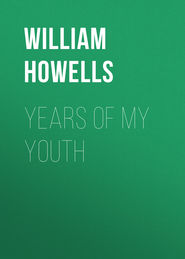По всем вопросам обращайтесь на: info@litportal.ru
(©) 2003-2024.
✖
Imaginary Interviews
Настройки чтения
Размер шрифта
Высота строк
Поля
"My Stoics?"
"Anybody's Stoics – did it by self-denial. When they saw a pleasure coming their way they sidestepped it; they went round the corner, and let it go by while they recruited their energies. Then when they saw a duty coming they stepped out and did it."
"It seems very simple. But aren't you rather cynical?"
"That's what people call one when one puts ethics picturesquely. But perhaps I've rather overdone it about the Stoics. Perhaps they wouldn't have refused to enjoy a pleasure at their own expense, at their cost in some sort of suffering to themselves. They really seem to have invented the Christian ideal of duty."
"And a very good thing. It may be all that will be left of Christianity in the end, if the Christian hope of reward goes as the Christian fear of punishment has gone. It seems to have been all there was of it in the beginning."
The second of the friends said at this, "I don't know that I should go so far as that."
The first returned, "Well, I don't know that I should ask you. I don't know that I go that far myself," he said, and then they laughed together again.
The man who was feeding the squirrel seemed to have exhausted his stock of peanuts, and he went away. After some hesitation the squirrel came toward the two friends and examined their countenances with a beady, greedy eye. He was really glutted with peanuts, and had buried the last where he would forget it, after having packed it down in the ground with his paws.
"No, no," the first of the friends said to the squirrel; "we are on the way back to being Stoics and practising the more self-denying virtues. You won't get any peanuts out of us. For one thing, we haven't got any."
"There's a boy," the second friend dreamily suggested, "down by the boat-house with a basketful."
"But I am teaching this animal self-denial. He will be a nobler squirrel all the rest of his life for not having the peanuts he couldn't get. That's like what I always try to feel in my own case. It's what I call character-building. Get along!"
The squirrel, to which the last words were addressed, considered a moment. Then it got along, after having inspected the whittlings at the feet of the friends to decide whether they were edible.
"I thought," the second of the friends said, "that your humanity included kindness to animals."
"I am acting for this animal's best good. I don't say but that, if the peanut-boy had come by with his basket, I shouldn't have yielded to my natural weakness and given the little brute a paper of them to bury. He seems to have been rather a saving squirrel – when he was gorged."
The mellow sunlight of the November day came down through the tattered foliage, and threw the shadows of the friends on the path where they sat, with their soft hats pulled over their foreheads. They were silent so long that when the second of them resumed their conversation he had to ask, "Where were we?"
"Cultivating force of character in squirrels."
"I thought we had got by that."
"Then we had come round to ourselves again."
"Something like that," the first friend reluctantly allowed.
"What a vicious circle! It seems to me that our first duty, if that's what you mean, is to get rid of ourselves."
"Whom should we have left? Other people? We mustn't pamper their egotism in chastising our own. We must use a great deal of caution in doing our duty. If I really loved that squirrel, if I were truly kind to animals, if I studied their best good, as disagreeable friends say they study ours, I should go after him and give him a hickory-nut that would wear down his teeth as nature intended; civilization is undermining the health of squirrels by feeding them peanuts, which allow their teeth to overgrow."
"That is true. Isn't it doing something of the same sort in other ways for all of us? If I hadn't lost my teeth so long ago, I'm sure I should feel them piercing from one jaw to another in their inordinate development. It's duty that keeps down the overgrowths that luxury incites. By-the-way, what set you thinking so severely about duty this beautiful Sunday morning? The neglected duty of going to church?"
"Ah, I call going to church a pleasure. No, I suppose it was an effect, a reverberation, of the tumult of my struggle to vote for the right man on Tuesday, when I knew that I was throwing my vote away if I did vote for him."
"But you voted for him?"
The first friend nodded.
"Which man was it?"
"What's the use? He was beaten —
'That is all you know or need to know.'"
"Of course he was beaten if it was your duty to vote for him," the second friend mused. "How patient the Creator must be with the result of His counsel to His creatures! He keeps on communing, commanding, if we are to believe Kant. It is His one certain way to affirm and corroborate Himself. Without His perpetual message to the human conscience, He does not recognizably exist; and yet more than half the time His mandate sends us to certain defeat, to certain death. It's enough to make one go in for the other side. Of course, we have to suppose that the same voice which intimates duty to us intimates duty to them?"
"And that they would like to obey it, if they could consistently with other interests and obligations?"
"Yes, they juggle with their sense of it; they pretend that the Voice does not mean exactly what it says. They get out of it that way."
"And the great, vital difference between ourselves and them is that we promptly and explicitly obey it; we don't palter with it in the slightest; 'we don't bandy words with our sovereign,' as Doctor Johnson said. I wonder," the speaker added, with the briskness of one to whom a vivid thought suddenly occurs, "how it would work if one went and did exactly the contrary of what was intimated to the human conscience?"
"That's not a new idea. There are people who habitually do so, or, rather, to whom an inverted moral law is delivered."
"You mean the people who beat you at the polls last Tuesday?"
"No, I mean the people in the asylums, some of them. They are said to hear the voice that bids us do right commanding them to do wrong. 'Thou shalt kill,' they hear it say, 'thou shalt steal, thou shalt bear false witness, thou shalt commit adultery, thou shalt not honor thy father and thy mother,' and so on through the Decalogue, with the inhibition thrown off or put on, as the case may be."
"How very hideous!" the second friend exclaimed. "It's like an emanation from the Pit. I mean the Pit that used to be. It's been abolished."
"And a very good thing. The noises from it went far to drown the voice of God, and bewildered some men so that they did not rightly know what the voice was saying. Now when people hear a voice bidding them do evil, we know what to do with them."
"And you think that the fellows who outvoted you on Tuesday heard the same voice that you heard; and they disobeyed it?"
"Ah, it's hard to say. We haven't got to the bottom of such things yet. Perhaps they disobeyed the voice provisionally, expecting to make a satisfactory explanation later on. Or perhaps they had put their civic consciences in the keeping of others, who gave them an official interpretation of the command, with instructions not to take it literally."
"That's very interesting," the second friend said. "Then it's your idea that no one really prefers to do wrong?"
"Not outside of the asylums. And even there they can plead authority. No, no, no! In a world pretty full of evil there isn't any purely voluntary evil among the sane. When the 'wicked,' as we call them, do wrong, it is provisionally only; they mean to do right presently and make it up with the heavenly powers. As long as an evil-doer lives he means to cease some time to do evil. He may put it off too long, or until he becomes ethically unsound. You know Swedenborg found that the last state of sinners was insanity."
"Dreadful!"
"But I've always thought very few reached that state. There's this curious thing about it all: we are not only ethically prompted by that inner voice, we are æsthetically prompted; it's a matter of taste as well as of conduct, too. The virtues are so clean, the vices so repulsively dirty. Justice is beautifully symmetrical; injustice is so shapeless, so unbalanced. Truth is such a pure line; falsehood is so out of drawing. The iniquities make you uncomfortable. The arts deny them."
The second friend drew a long breath. "Then I don't see why there are so many."
"Well," the first friend suggested, "there seems to be a difficulty. Some say that they have to be employed as antitheses; we can't get on without them, at least at this stage of the proceedings. Perhaps we shall advance so far that we shall be able to use historical or accomplished evil for the contrasts by which we shall know actual good."
"I don't see how you make that out."
"Why, there are already some regions of the globe where the summer does not require the antithesis of winter for its consciousness. Perhaps in the moral world there will yet be a condition in which right shall not need to contrast itself with wrong. We are still meteorologically very imperfect."
"And how do you expect to bring the condition about? By our always doing our duty?"
"Well, we sha'n't by not doing it."
XVII
"Anybody's Stoics – did it by self-denial. When they saw a pleasure coming their way they sidestepped it; they went round the corner, and let it go by while they recruited their energies. Then when they saw a duty coming they stepped out and did it."
"It seems very simple. But aren't you rather cynical?"
"That's what people call one when one puts ethics picturesquely. But perhaps I've rather overdone it about the Stoics. Perhaps they wouldn't have refused to enjoy a pleasure at their own expense, at their cost in some sort of suffering to themselves. They really seem to have invented the Christian ideal of duty."
"And a very good thing. It may be all that will be left of Christianity in the end, if the Christian hope of reward goes as the Christian fear of punishment has gone. It seems to have been all there was of it in the beginning."
The second of the friends said at this, "I don't know that I should go so far as that."
The first returned, "Well, I don't know that I should ask you. I don't know that I go that far myself," he said, and then they laughed together again.
The man who was feeding the squirrel seemed to have exhausted his stock of peanuts, and he went away. After some hesitation the squirrel came toward the two friends and examined their countenances with a beady, greedy eye. He was really glutted with peanuts, and had buried the last where he would forget it, after having packed it down in the ground with his paws.
"No, no," the first of the friends said to the squirrel; "we are on the way back to being Stoics and practising the more self-denying virtues. You won't get any peanuts out of us. For one thing, we haven't got any."
"There's a boy," the second friend dreamily suggested, "down by the boat-house with a basketful."
"But I am teaching this animal self-denial. He will be a nobler squirrel all the rest of his life for not having the peanuts he couldn't get. That's like what I always try to feel in my own case. It's what I call character-building. Get along!"
The squirrel, to which the last words were addressed, considered a moment. Then it got along, after having inspected the whittlings at the feet of the friends to decide whether they were edible.
"I thought," the second of the friends said, "that your humanity included kindness to animals."
"I am acting for this animal's best good. I don't say but that, if the peanut-boy had come by with his basket, I shouldn't have yielded to my natural weakness and given the little brute a paper of them to bury. He seems to have been rather a saving squirrel – when he was gorged."
The mellow sunlight of the November day came down through the tattered foliage, and threw the shadows of the friends on the path where they sat, with their soft hats pulled over their foreheads. They were silent so long that when the second of them resumed their conversation he had to ask, "Where were we?"
"Cultivating force of character in squirrels."
"I thought we had got by that."
"Then we had come round to ourselves again."
"Something like that," the first friend reluctantly allowed.
"What a vicious circle! It seems to me that our first duty, if that's what you mean, is to get rid of ourselves."
"Whom should we have left? Other people? We mustn't pamper their egotism in chastising our own. We must use a great deal of caution in doing our duty. If I really loved that squirrel, if I were truly kind to animals, if I studied their best good, as disagreeable friends say they study ours, I should go after him and give him a hickory-nut that would wear down his teeth as nature intended; civilization is undermining the health of squirrels by feeding them peanuts, which allow their teeth to overgrow."
"That is true. Isn't it doing something of the same sort in other ways for all of us? If I hadn't lost my teeth so long ago, I'm sure I should feel them piercing from one jaw to another in their inordinate development. It's duty that keeps down the overgrowths that luxury incites. By-the-way, what set you thinking so severely about duty this beautiful Sunday morning? The neglected duty of going to church?"
"Ah, I call going to church a pleasure. No, I suppose it was an effect, a reverberation, of the tumult of my struggle to vote for the right man on Tuesday, when I knew that I was throwing my vote away if I did vote for him."
"But you voted for him?"
The first friend nodded.
"Which man was it?"
"What's the use? He was beaten —
'That is all you know or need to know.'"
"Of course he was beaten if it was your duty to vote for him," the second friend mused. "How patient the Creator must be with the result of His counsel to His creatures! He keeps on communing, commanding, if we are to believe Kant. It is His one certain way to affirm and corroborate Himself. Without His perpetual message to the human conscience, He does not recognizably exist; and yet more than half the time His mandate sends us to certain defeat, to certain death. It's enough to make one go in for the other side. Of course, we have to suppose that the same voice which intimates duty to us intimates duty to them?"
"And that they would like to obey it, if they could consistently with other interests and obligations?"
"Yes, they juggle with their sense of it; they pretend that the Voice does not mean exactly what it says. They get out of it that way."
"And the great, vital difference between ourselves and them is that we promptly and explicitly obey it; we don't palter with it in the slightest; 'we don't bandy words with our sovereign,' as Doctor Johnson said. I wonder," the speaker added, with the briskness of one to whom a vivid thought suddenly occurs, "how it would work if one went and did exactly the contrary of what was intimated to the human conscience?"
"That's not a new idea. There are people who habitually do so, or, rather, to whom an inverted moral law is delivered."
"You mean the people who beat you at the polls last Tuesday?"
"No, I mean the people in the asylums, some of them. They are said to hear the voice that bids us do right commanding them to do wrong. 'Thou shalt kill,' they hear it say, 'thou shalt steal, thou shalt bear false witness, thou shalt commit adultery, thou shalt not honor thy father and thy mother,' and so on through the Decalogue, with the inhibition thrown off or put on, as the case may be."
"How very hideous!" the second friend exclaimed. "It's like an emanation from the Pit. I mean the Pit that used to be. It's been abolished."
"And a very good thing. The noises from it went far to drown the voice of God, and bewildered some men so that they did not rightly know what the voice was saying. Now when people hear a voice bidding them do evil, we know what to do with them."
"And you think that the fellows who outvoted you on Tuesday heard the same voice that you heard; and they disobeyed it?"
"Ah, it's hard to say. We haven't got to the bottom of such things yet. Perhaps they disobeyed the voice provisionally, expecting to make a satisfactory explanation later on. Or perhaps they had put their civic consciences in the keeping of others, who gave them an official interpretation of the command, with instructions not to take it literally."
"That's very interesting," the second friend said. "Then it's your idea that no one really prefers to do wrong?"
"Not outside of the asylums. And even there they can plead authority. No, no, no! In a world pretty full of evil there isn't any purely voluntary evil among the sane. When the 'wicked,' as we call them, do wrong, it is provisionally only; they mean to do right presently and make it up with the heavenly powers. As long as an evil-doer lives he means to cease some time to do evil. He may put it off too long, or until he becomes ethically unsound. You know Swedenborg found that the last state of sinners was insanity."
"Dreadful!"
"But I've always thought very few reached that state. There's this curious thing about it all: we are not only ethically prompted by that inner voice, we are æsthetically prompted; it's a matter of taste as well as of conduct, too. The virtues are so clean, the vices so repulsively dirty. Justice is beautifully symmetrical; injustice is so shapeless, so unbalanced. Truth is such a pure line; falsehood is so out of drawing. The iniquities make you uncomfortable. The arts deny them."
The second friend drew a long breath. "Then I don't see why there are so many."
"Well," the first friend suggested, "there seems to be a difficulty. Some say that they have to be employed as antitheses; we can't get on without them, at least at this stage of the proceedings. Perhaps we shall advance so far that we shall be able to use historical or accomplished evil for the contrasts by which we shall know actual good."
"I don't see how you make that out."
"Why, there are already some regions of the globe where the summer does not require the antithesis of winter for its consciousness. Perhaps in the moral world there will yet be a condition in which right shall not need to contrast itself with wrong. We are still meteorologically very imperfect."
"And how do you expect to bring the condition about? By our always doing our duty?"
"Well, we sha'n't by not doing it."
XVII











